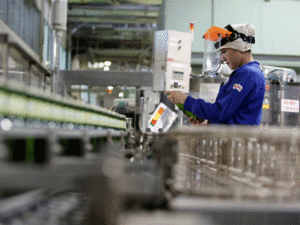Loading
Search
▼ Japan Factory Output Falls In Sign Of Rising Pressure On Economy
- Category:Event
TOKYO: Japan's industrial output contracted in November and partially reversed the previous month's gain, in a sign of fragility in factory activity as increasing global risks threaten to undermine the country's export-reliant economy.
The 1.1 percent month-on-month fall, pressured by a pullback in production of general purpose machinery, compared with a median market forecast of a 1.9 percent decline, following a 2.9 percent increase in October, the data showed.
While the latest figure was better than expected, the outlook wasn't smooth sailing for Japanese manufacturers.
Manufacturers surveyed by the Ministry of Economy, Trade and Industry (METI) expect output to rise 2.2 percent in December but decline 0.8 percent in January, the data showed.
Friday's data comes at a time of heightening volatility in global markets on concerns over slowing growth in U.S. and Chinese economies, uncertainty about U.S. fiscal and monetary policies, and trade protectionism.
Economists expect factory output and economic growth to rebound in the current quarter after a run of natural disasters disrupted production and triggered a third-quarter economic contraction. However, authorities remain wary about the potential impact of the China-U.S. trade war, which has not yet shown up in Japan's output data.
Separate data showed Japan's jobless rate rose to 2.5 percent in November from 2.4 percent in October, and the jobs availability grew to 1.63 jobs per applicant from 1.62 in the previous month, near a 44-year high.
Japan's ageing and shrinking population has led to a tight job market, causing labour shortages and pushing up wages gradually as many companies scramble to attract workers.
Despite more than five years of the Bank of Japan's (BOJ) massive monetary stimulus to conquer price declines, however, inflation is struggling to accelerate, underscoring the challenge the central bank faces.
Analysts say the BOJ is in no position to normalise monetary policy anytime soon despite concerns about side-effects from a prolonged easy money policy, such as a hit to banks' profits because of dwindling margins due to ultra-low interest rates.
Some flag the possibility of further easing down the road given tame inflation, and risks to Japan's export-led economy and business investment from a slowdown in global economic growth. Consumer inflation remains well below the BOJ's 2 percent goal.
Tokyo-area's core consumer price index (CPI), which includes oil products but excludes fresh food prices, rose 0.9 percent in the year to December, slowing from 1.0 percent in November and matching the 0.9 percent forecast by economists.
The Tokyo index is available a month before nationwide core CPI, and serves as a leading indicator of consumer inflation.
Japanese retail sales rose 1.4 percent in the year to November, slowing from the biggest gain in 10 months seen in October at 3.6 percent, versus a 2.2 percent gain expected by economists, separate data showed.
The 1.1 percent month-on-month fall, pressured by a pullback in production of general purpose machinery, compared with a median market forecast of a 1.9 percent decline, following a 2.9 percent increase in October, the data showed.
While the latest figure was better than expected, the outlook wasn't smooth sailing for Japanese manufacturers.
Manufacturers surveyed by the Ministry of Economy, Trade and Industry (METI) expect output to rise 2.2 percent in December but decline 0.8 percent in January, the data showed.
Friday's data comes at a time of heightening volatility in global markets on concerns over slowing growth in U.S. and Chinese economies, uncertainty about U.S. fiscal and monetary policies, and trade protectionism.
Economists expect factory output and economic growth to rebound in the current quarter after a run of natural disasters disrupted production and triggered a third-quarter economic contraction. However, authorities remain wary about the potential impact of the China-U.S. trade war, which has not yet shown up in Japan's output data.
Separate data showed Japan's jobless rate rose to 2.5 percent in November from 2.4 percent in October, and the jobs availability grew to 1.63 jobs per applicant from 1.62 in the previous month, near a 44-year high.
Japan's ageing and shrinking population has led to a tight job market, causing labour shortages and pushing up wages gradually as many companies scramble to attract workers.
Despite more than five years of the Bank of Japan's (BOJ) massive monetary stimulus to conquer price declines, however, inflation is struggling to accelerate, underscoring the challenge the central bank faces.
Analysts say the BOJ is in no position to normalise monetary policy anytime soon despite concerns about side-effects from a prolonged easy money policy, such as a hit to banks' profits because of dwindling margins due to ultra-low interest rates.
Some flag the possibility of further easing down the road given tame inflation, and risks to Japan's export-led economy and business investment from a slowdown in global economic growth. Consumer inflation remains well below the BOJ's 2 percent goal.
Tokyo-area's core consumer price index (CPI), which includes oil products but excludes fresh food prices, rose 0.9 percent in the year to December, slowing from 1.0 percent in November and matching the 0.9 percent forecast by economists.
The Tokyo index is available a month before nationwide core CPI, and serves as a leading indicator of consumer inflation.
Japanese retail sales rose 1.4 percent in the year to November, slowing from the biggest gain in 10 months seen in October at 3.6 percent, versus a 2.2 percent gain expected by economists, separate data showed.
- December 29, 2018
- Comment (0)
- Trackback(0)


